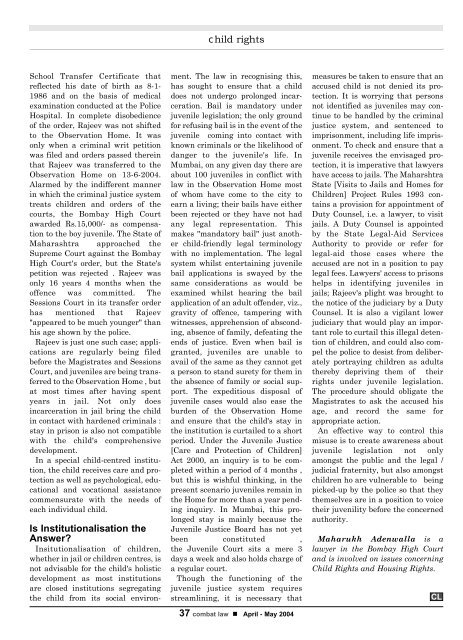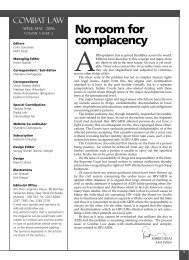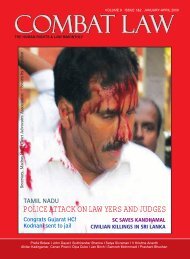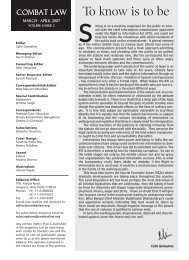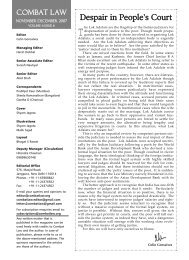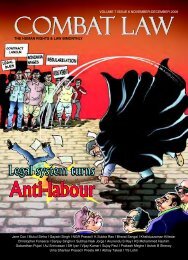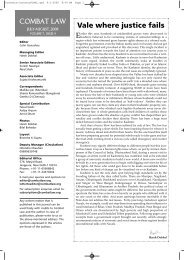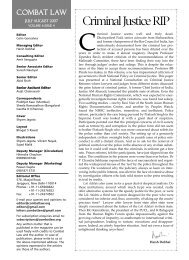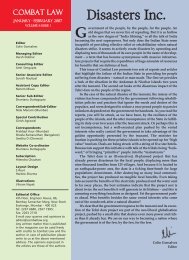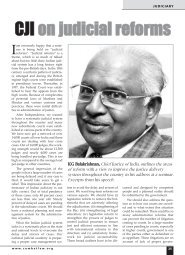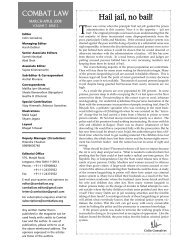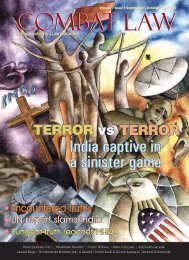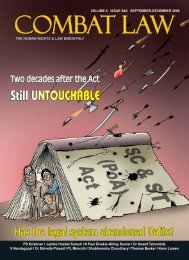PDF, 1.1MB - Combat Law
PDF, 1.1MB - Combat Law
PDF, 1.1MB - Combat Law
Create successful ePaper yourself
Turn your PDF publications into a flip-book with our unique Google optimized e-Paper software.
child rightsSchool Transfer Certificate thatreflected his date of birth as 8-1-1986 and on the basis of medicalexamination conducted at the PoliceHospital. In complete disobedienceof the order, Rajeev was not shiftedto the Observation Home. It wasonly when a criminal writ petitionwas filed and orders passed thereinthat Rajeev was transferred to theObservation Home on 13-6-2004.Alarmed by the indifferent mannerin which the criminal justice systemtreats children and orders of thecourts, the Bombay High Courtawarded Rs.15,000/- as compensationto the boy juvenile. The State ofMaharashtra approached theSupreme Court against the BombayHigh Court's order, but the State'spetition was rejected . Rajeev wasonly 16 years 4 months when theoffence was committed. TheSessions Court in its transfer orderhas mentioned that Rajeev"appeared to be much younger" thanhis age shown by the police.Rajeev is just one such case; applicationsare regularly being filedbefore the Magistrates and SessionsCourt, and juveniles are being transferredto the Observation Home , butat most times after having spentyears in jail. Not only doesincarceration in jail bring the childin contact with hardened criminals :stay in prison is also not compatiblewith the child's comprehensivedevelopment.In a special child-centred institution,the child receives care and protectionas well as psychological, educationaland vocational assistancecommensurate with the needs ofeach individual child.Is Institutionalisation theAnswer?Insitutionalisation of children,whether in jail or children centres, isnot advisable for the child's holisticdevelopment as most institutionsare closed institutions segregatingthe child from its social environment.The law in recognising this,has sought to ensure that a childdoes not undergo prolonged incarceration.Bail is mandatory underjuvenile legislation; the only groundfor refusing bail is in the event of thejuvenile coming into contact withknown criminals or the likelihood ofdanger to the juvenile's life. InMumbai, on any given day there areabout 100 juveniles in conflict withlaw in the Observation Home mostof whom have come to the city toearn a living; their bails have eitherbeen rejected or they have not hadany legal representation. Thismakes "mandatory bail" just anotherchild-friendly legal terminologywith no implementation. The legalsystem whilst entertaining juvenilebail applications is swayed by thesame considerations as would beexamined whilst hearing the bailapplication of an adult offender, viz.,gravity of offence, tampering withwitnesses, apprehension of absconding,absence of family, defeating theends of justice. Even when bail isgranted, juveniles are unable toavail of the same as they cannot geta person to stand surety for them inthe absence of family or social support.The expeditious disposal ofjuvenile cases would also ease theburden of the Observation Homeand ensure that the child's stay inthe institution is curtailed to a shortperiod. Under the Juvenile Justice[Care and Protection of Children]Act 2000, an inquiry is to be completedwithin a period of 4 months ,but this is wishful thinking, in thepresent scenario juveniles remain inthe Home for more than a year pendinginquiry. In Mumbai, this prolongedstay is mainly because theJuvenile Justice Board has not yetbeen constituted ,the Juvenile Court sits a mere 3days a week and also holds charge ofa regular court.Though the functioning of thejuvenile justice system requiresstreamlining, it is necessary that37 combat law • April - May 2004measures be taken to ensure that anaccused child is not denied its protection.It is worrying that personsnot identified as juveniles may continueto be handled by the criminaljustice system, and sentenced toimprisonment, including life imprisonment.To check and ensure that ajuvenile receives the envisaged protection,it is imperative that lawyershave access to jails. The MaharshtraState [Visits to Jails and Homes forChildren] Project Rules 1993 containsa provision for appointment ofDuty Counsel, i.e. a lawyer, to visitjails. A Duty Counsel is appointedby the State Legal-Aid ServicesAuthority to provide or refer forlegal-aid those cases where theaccused are not in a position to paylegal fees. <strong>Law</strong>yers' access to prisonshelps in identifying juveniles injails; Rajeev's plight was brought tothe notice of the judiciary by a DutyCounsel. It is also a vigilant lowerjudiciary that would play an importantrole to curtail this illegal detentionof children, and could also compelthe police to desist from deliberatelyportraying children as adultsthereby depriving them of theirrights under juvenile legislation.The procedure should obligate theMagistrates to ask the accused hisage, and record the same forappropriate action.An effective way to control thismisuse is to create awareness aboutjuvenile legislation not onlyamongst the public and the legal /judicial fraternity, but also amongstchildren ho are vulnerable to beingpicked-up by the police so that theythemselves are in a position to voicetheir juvenility before the concernedauthority.Maharukh Adenwalla is alawyer in the Bombay High Courtand is involved on issues concerningChild Rights and Housing Rights.CL


